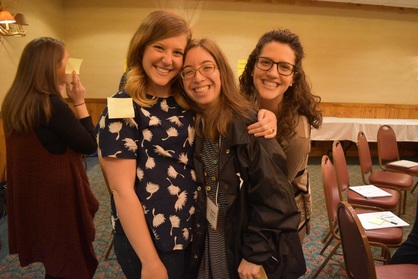Click here to return to the main Education Newsletter page for this month! |
Teacher Training Makes All The DifferenceBy Rachel Fraade
As we head into a new school year, it’s critical to equip both teachers, as well as students, with the skills to succeed. Before the semester starts, it's helpful to think about who your teachers are, what you can offer them, what you should expect from them, and how to make the most of everyone’s time. Are the majority of your congregation’s teachers college students, parent volunteers, trained Jewish educators, or a mix of these and others? No matter the makeup of your staff, the entire school can benefit from teacher trainings throughout the year. Depending on your community, you may choose to utilize specific kinds of teacher trainings. You may prefer a scheduling and planning meeting, during which teachers meet to outline and review upcoming events and the school schedule. This can be useful a few times a year, especially if the schedule is very full or changes as the year goes on. Teachers also often appreciate a chance to check in; they may need advice, a chance to celebrate, or support as they share challenges in the classroom. It is also important to show teachers that you appreciate them. Two great ways to do this are with a holiday celebration, or by thanking them in person or with a larger gathering. In addition, a simple verbal “thank you” or pointed compliment goes a long way. In addition to celebrating and supporting teachers, it is important to supervise them. For some directors this means popping into a class briefly. For others, it means spending one-on-one time with teachers, helping them to grow and develop. No matter the form your supervision takes, you must always make it clear that you trust teachers to run their own classrooms. If you cannot provide this kind of supervision for all of your teachers, you can set teachers up in pairs, encouraging veterans to take on a mentorship role for newer teachers. Another way to encourage teachers to learn from each other is by studying as a faculty. This models Jewish learning, allows teachers to touch base with their own sense of curiosity, and strengthens teachers’ Jewish knowledge. Some challenges to teacher training may include busy teachers, low interest, difficulty of planning ahead, or not knowing what to do with teachers. Ways to combat these include working with the teachers’ schedules or childcare needs, providing food or extra pay for incentive, setting a time well in advance, and coming up with goals for the teachers to meet throughout teacher training. If you’re looking for even more teacher training ideas, our teacher training supplement has a list of ten great ones. In addition, your Fellow can always guide you to our program bank, which has even more innovative teacher trainings. Whatever your needs, don’t forget to call your Fellow for ideas and assistance! |
- Home
- WHO WE ARE
-
WHAT WE DO
- PODCAST
- Conference >
- Education >
-
CULTURE
>
- Culture Overview
- Cultural Programming >
-
History
>
-
Encyclopedia of Southern Jewish Communities
>
- Alabama Encyclopedia
- Arkansas Encyclopedia
- Georgia Encyclopedia
- Florida Encyclopedia
- Kentucky Encyclopedia
- Louisiana Encyclopedia
- Mississippi Encyclopedia
- North Carolina Encyclopedia
- Oklahoma Encyclopedia
- South Carolina Encyclopedia
- Tennessee Encyclopedia
- Texas Encyclopedia
- Virginia Encyclopedia
- Encyclopedia Credits
- Oral History
-
Encyclopedia of Southern Jewish Communities
>
- SPIRITUALITY >
- DONATE
- Shalom Y'all
- Strategic Plan
- Southern & Jewish Blog
- Calendar
- Virtual Press Kit
|
©2024 Goldring/Woldenberg Institute of Southern Jewish Life
|

